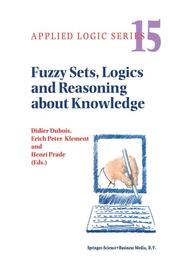-
Zusatztext
-
Fuzzy Sets, Logics and Reasoning about Knowledge reports recent results concerning the genuinely logical aspects of fuzzy sets in relation to algebraic considerations, knowledge representation and commonsense reasoning. It takes a state-of-the-art look at multiple-valued and fuzzy set-based logics, in an artificial intelligence perspective. The papers, all of which are written by leading contributors in their respective fields, are grouped into four sections. The first section presents a panorama of many-valued logics in connection with fuzzy sets. The second explores algebraic foundations, with an emphasis on MV algebras. The third is devoted to approximate reasoning methods and similarity-based reasoning. The fourth explores connections between fuzzy knowledge representation, especially possibilistic logic and prioritized knowledge bases. Readership: Scholars and graduate students in logic, algebra, knowledge representation, and formal aspects of artificial intelligence.
-
-
Kurztext
-
These papers report on end-of-millennium results concerning the genuinely logical aspects of fuzzy sets in relation to algebraic considerations, knowledge representation and commonsense reasoning. They look at multiple-valued and fuzzy set-based logics, in an artificial intelligence perspective.
-
-
Autorenportrait
- InhaltsangabeEditorial Preface; D.M. Gabby. Introduction. Part I: Advances in Multiple-valued Logics. The Poincaré Paradox and Non-classical Logics; U. Höhle. Propositional Fuzzy Logics based on Frank t-norms: A comparison; E.P. Klement, M. Navara. A Resolution-based Axiomatisation of `Bold' Propositional Fuzzy Logic; S. Lehmke. How to Make Your Logic Fuzzy: Fibred Semantics and The Weaving of Logics; D.M. Gabbay. Introducing Grade to Some Metalogical Notions; M.K. Chakraborty, S. Basu. Closure Operators, Fuzzy Logic and Constraints; G. Gerla. Part II: Algebraic Aspects of Multiple-valued Logics. Ulam Game, the Logic of MaxSat, and Many-valued Partitions; D. Mundici. A Many-valued Generalisation of the Ultrapower Construction; C.A. Drossos. Gabriel Filters and the Spectrum of an MV-Algebra; P. Karazeris. Conditional States in Finite-valued Logics; A. Di Nola, et al. Conditioning on MV-algebras and Additive Measures - further results; S. Weber. Part III: Advances in Approximate Reasoning. Toward Adequacy Conditions for Inference Schemata in Approximate Reasoning: The Case of the Rule of Syllogism; S. Gottwald. Formal Theories in Fuzzy Logic; V. Novák. A Note on Fuzzy Inference as Deduction; L. Godo, P. Hájek. The Role of Similarity in Fuzzy Reasoning; F. Klawonn. T-indistinguishability Operators and Approximate Reasoning via CRI; D. Boixader, J. Jacas. About Similarity-based Logical Systems; F. Esteva, et al. On Similarity-based Fuzzy Clusterings; H. Thiele. Part IV: Reasoning about Information and Knowledge. Informational Representability: Abstract Models versus Concrete Models; S. Demri, E. Orlowska. From Possibilistic Information toKleene's Strong Multi-valued Logics; G. De Cooman. A Roadmap of Qualitative Independence; D. Dubois, et al. Truth Functionality and Measure-based Logics; L. Boldrin, C. Sossai. Logic Programs with Context-dependent Preferences; G. Brewka. An Overview of Inconsistency-tolerant Inferences in Prioritized Knowledge Bases; S. Benferhat, et al. Index.
Detailansicht
Fuzzy Sets, Logics and Reasoning about Knowledge
Applied Logic Series 15
ISBN/EAN: 9780792359777
Umbreit-Nr.: 1617249
Sprache:
Englisch
Umfang: ix, 425 S.
Format in cm:
Einband:
gebundenes Buch
Erschienen am 30.09.1999


